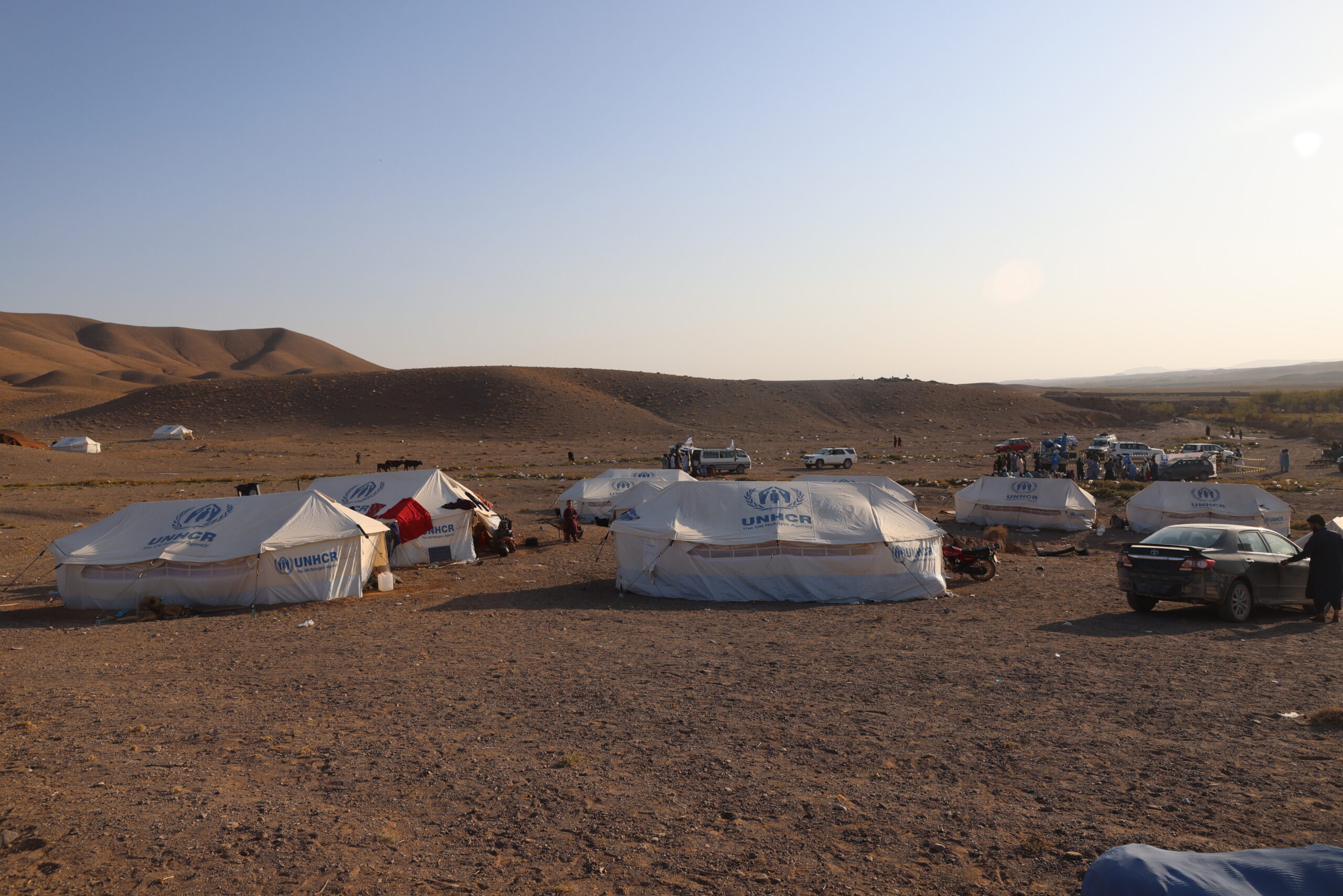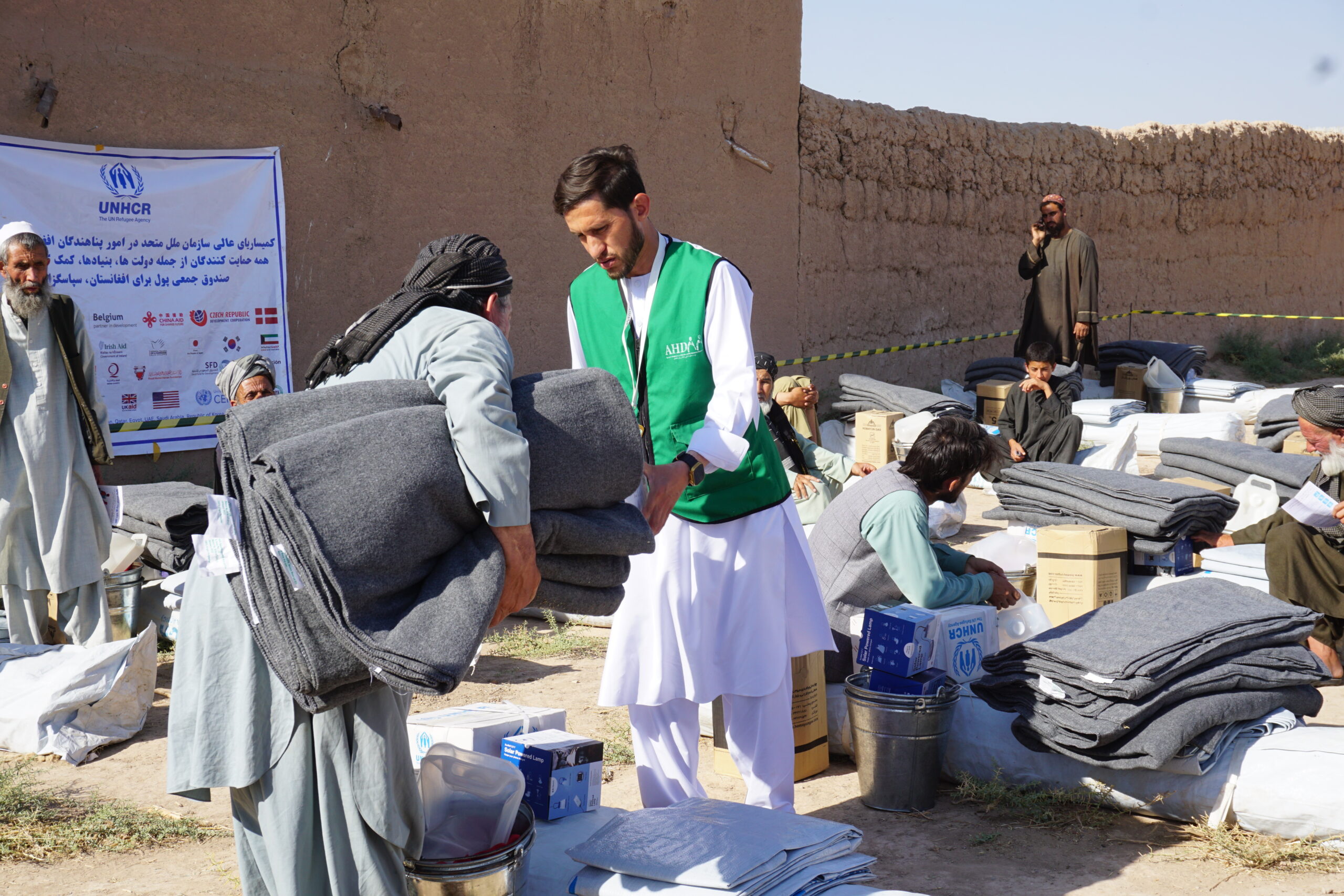The seismic events that occurred on 7 and 11 October, have left Afghanistan in disarray, directly impacting 250,000 people, claiming over 1,400 lives, and leaving 19,250 individuals, spanning 3,197 families, in dire need across seven districts. Denmark’s commitment to humanitarian efforts is making it possible for UNHCR, the UN Refugee Agency, to scale up the response as Afghanistan grapples with the aftermath of the two devastating earthquakes.

UNHCR and partners provide emergency relief and assistance to families affected by earthquakes in Herat, Afghanistan. © UNHCR/Caroline Gluck
Vulnerable communities in Afghanistan, including returnee refugees and Internally Displaced People (IDPs), are once again navigating the challenging path of rebuilding their lives. Afghanistan was already home to over 3.2 million IDPs, over 52,000 refugees, and around 13,500 Afghan refugee returnees before the earthquakes struck.
UNHCR, through its Field Office in Herat and together with international and national partners, responded swiftly to the crisis. Teams have been on the ground since day one distributing tents, tarpaulin, blankets, kitchen sets, sanitary items, and solar lamps, to address the immediate needs of the affected population. These items have proven indispensable in helping people stay warm, prepare meals, maintain hygiene, and navigate safely during the dark hours.
As the weeks pass, the challenges persist, with tens of thousands of survivors still sleeping outdoors. The earthquakes destroyed or damaged over 48,000 homes, leaving a staggering 1,480 dead. UNHCR and its partners continue their vital work, distributing emergency tents and core relief items, despite facing a funding shortfall.
A few days after the second earthquake, UNHCR launched an urgent funding appeal of $14.4 million to be able to scale up its operations in the country and its response to the situation. However, funding shortage is a common obstacle for aid agencies, competing global emergencies and donor fatigue have left agencies struggling to secure funding. The situation is exacerbated by the ongoing deportation of thousands of undocumented Afghans from neighboring Pakistan.
Traditional clay-built homes in Zinda Jan, at the epicenter of the first quake, now lie in ruins, exposing residents to sandstorms and biting cold. The emotional toll is palpable, with families mourning lost loved ones and grappling with the trauma of displacement. UNHCR is providing psychosocial support to aid in the recovery of those most affected, for example women, children and elderly who were more likely to be home at the time of the first quake.
The prospect of winter intensifies the urgency for proper shelter. The international community’s assistance is pivotal in supporting these communities as they navigate the path to recovery, rebuilding homes and surviving through the winter. Denmark plays a crucial role in UNHCR’s response, showcasing the collective efforts needed to alleviate the suffering of those affected by this humanitarian crisis.

UNHCR’s swift response has provided crucial aid by offering emergency shelter through the distribution of more than 11,123 tarpaulins, 1,921 family tents, and 48 refugee housing units to individuals whose homes were devastated, ensuring protection against the elements.

In the wake of the earthquakes, UNHCR has given heightened attention to vulnerable groups, distributing more than 10,482 sanitary napkins, 10,423 metallic buckets, 27,966 pieces of laundry soap, 14,766 pieces of toilet soap, and 15,723 pieces of underwear. This is necessary to help people stay healthy and maintain their dignity.

Many people, especially children who have been orphaned or separated from their families, need help to process the trauma of living through a natural disaster, as well as the loss of loved ones and their homes. UNHCR is providing essential psychosocial support through a national partner.

UNHCR is, together with partners, attempting to implement community-based protection interventions, including measures to prevent, protect, and respond to gender-based violence. This is central to UNHCR’s protection response.

With winter approaching and more than 48,000 homes destroyed or damaged, the need for core relief and winter items is high. Aside from emergency shelter, UNHCR has distributed 19,436 blankets to help people stay warm and 5,568 gas cookers to cook and heat up food, as well as winter clothing, heaters, and solar lamps.

To assist with rent during the winter months, UNHCR will implement a tailored multipurpose cash assistance programme. This approach is vital in emergencies as affected populations can best determine their own needs, it empowers forcibly displaced people to exercise agency with dignity and it contributes to the local economy.
Denmark as a donor to UNHCR:
As UNHCR’s ninth biggest government donor, and fifth largest per capita, in 2023 with a five-year agreement for the period 2022-2026, Denmark is a committed long-term partner to UNHCR. In 2022, Denmark contributed with a total of $106.9 million to UNHCR, of which $35.6 million was unearmarked. Thus far in 2023, Denmark has contributed with $91.9 million to UNHCR in total, out of which $35.6 million was unearmarked.
In 2023, Denmark had contributed with $7.5 million of earmarked funding to the already pressing humanitarian situation in Afghanistan. After the earthquakes, they swiftly contributed with an additional $2.3 million in targeted funding from Denmark’s emergency reserve towards the Afghanistan earthquake response.
Share on Facebook Share on Twitter